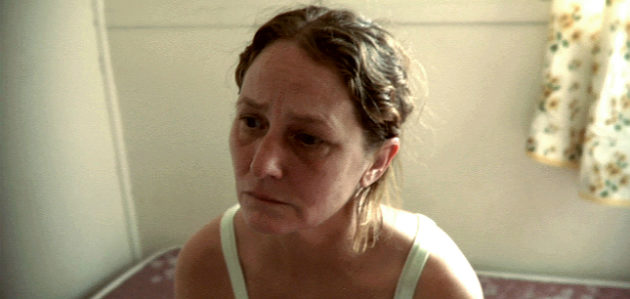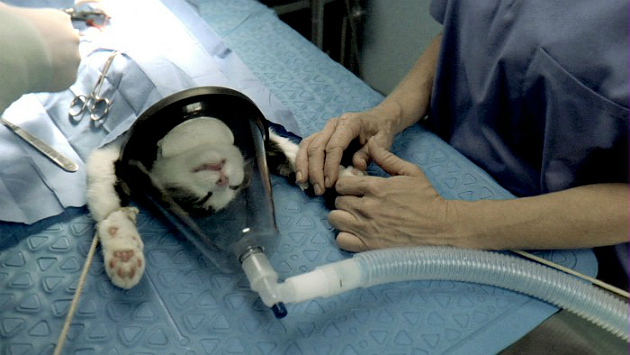SXSW: Melissa Leo Considers Post-Oscar Offers, Animal Ethics, and Her Minimalist Tour de Force Francine

As we watch Francine’s journey unfold onscreen there are a couple of moments and scenes that will likely jump out to viewers. Francine’s relationship with animals is significant; she not only takes them in as her companions, she also at one point works as a veterinary assistant. There’s a key sequence in which we see a cat injected and put under sedation, followed by a moment in which you cradle a dog as it’s being euthanized, and I have to ask… what were the circumstances of shooting those veterinary scenes? Because they certainly felt real.
[It was] an appointment he had had standing for many weeks beforehand! [Laughs] This was the part of the film, when we were shooting at the vet’s, when my world walked right into their documentary world. It was fascinating to be there as Francine and be permitted by this veterinarian to be there. ‘Don’t you need me to put a mask on?’ ‘No, no, you’re fine.’ It’s a great question, and it’s important first of all for people to understand – I think I’m pretty much an animal lover but these guys live and die for the beasts. Their love for them is so palpable and strong, that the notion of making Francine with anybody ever being hurt in the process, they would sooner hurt me than the animals! [Laughs]
I knew in my brain that there was no way these animals were at risk of actual harm, but the emotion of the moment certainly feels real; you feel that this creature is being put to sleep before your eyes.
That’s moviemaking! That cleverness on the filmmaker’s part to time it and understand my belief, as Francine, that I am holding a dying dog, that makes you believe. That’s what we’re doing here together.

From your point of view, what are the ethical complications, if any, of even integrating real anesthetization into a fiction film?
It’s interesting, the question arises; how many of the many, many films they have here at SXSW portray a human being dying, by natural causes or by someone else’s hand? Human death in films is so common, you can’t have a movie without somebody dying! The notion of animals, that there wouldn’t be some way to use that life reality in the same exact way that we do…
When you look at your current and future choices of projects, how do you see the balance of smaller films like Francine versus bigger, more mainstream films?
Well maybe when they offer me those bigger films I’ll have to consider balancing them! [Laughs] I think everything’s going to be just fine, it is looking like a very nice year. I have had a job these last three years on HBO doing Treme, and in a way my time is built around Treme just now. I think that things will come and go and change, but honestly it felt the summer before last I had been working on Treme and that seemed to be a good money earner – I’m not a billionaire from it but it’s a nice steady gig – so when I saw this come up in the Hudson Valley I thought, ‘Oh! I can spend a month at home and be near home shooting a movie, and I love the Hudson Valley and sharing that on film with people.’ I don’t know if my choosing has been quite as discerning as the body of characters I’ve played; I’ve taken what’s come along, and I think that in the next little while here it’ll continue to be the same. I’ll have the opportunity to help newer filmmakers discover new and different aspects of film and continue to work in larger machines. I shot two days on [Robert] Zemeckis’s Flight with Denzel Washington and those two days are going to get me a lot of mileage next year when that movie comes out. So it’s all going along really fabulously and I’m really glad and pleased with the timing of Francine, too – it feels really beautiful to me after working off-Broadway in theater, independent film, and the quirky television thing. It fits right in with me and my work.
Talking with you about your work philosophy reminds me of the “Consider” campaign you ran yourself, and successfully. Do you still feel like you need to be proactive about your own image and brand in certain ways?
Nobody’s asked me about that for a long time, and it was very misunderstood. I did it. I initiated it being done, with the help of close friends I actualized it. Had I asked representation or the other people that actors work with they would have strongly advised against me doing such a thing. Why, I don’t know… maybe they didn’t understand my intention, either. Maybe they were fearful for what seems to have been the result of it; it got a lot of nasty things said online, but that was not my intention at all. My intention was this: I was being considered, or so it seemed at that point, and getting prizes in lots of places, for playing a woman who is a good 20 years older than I am. If I’m going to have a chance at winning an Oscar and being able to think of myself as a movie star in some kind of way, and maybe getting that kind of work one day, it dawned on me that I would have to show Hollywood that I can show up like a movie star.
I had asked a publicist to get me the cover of a magazine, but there was no cover of no magazine. When I finally solicited from the publicist, ‘Tell me what they say – I know they say no, you’ve told me you asked them but what do they say? I need to hear a reason.’ Too old, not big enough box office. Okay, well that’s factual. I don’t need to take an insult from that; now I have some facts to work with. So I got myself up like a movie star, and I paid my own money, and I said to Hollywood, simply, ‘Consider.’ Not for an Academy Award, not for a blah blah blah, but just ‘Consider.’ To me it seemed a gracious thing to do. To me it seemed a way of taking care of my own business. That’s all it was.
You’re much more candid about most actors about acknowledging the need to be proactive in your own career and aware of the machine and how you fit into it.
The machine’s never carried me along. I’m only in the machine because I’ve insisted on being there.
Follow Jen Yamato on Twitter.
Follow Movieline on Twitter.
Get more of Movieline's SXSW 2012 coverage here.
Pages: 1 2
